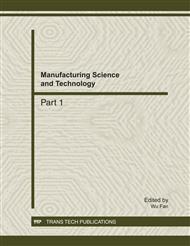[1]
M. Willatzen, N. B. O. L. Pettit, L. Ploug Sorensen, A general dynamic simulation model for evaporators and condensers in refrigeration. Part Ⅰ : Moving-boundary formulation of two-phase flows with heat exchange, Int. J. Refrig., Vol. 21, No. 5 1998, pp.398-403.
DOI: 10.1016/s0140-7007(97)00091-1
Google Scholar
[2]
M. Willatzen, N. B. O. L. Pettit, L. Ploug Sorensen, A general dynamic simulation model for evaporators and condensers in refrigeration. Part Ⅱ : Simulation and control of an evaporator, Int. J. Refrig. Vol. 21, No. 5, 1998, pp.404-414.
DOI: 10.1016/s0140-7007(97)00092-3
Google Scholar
[3]
R. N. N. Koury, L. Machado, K. A. R. Ismail, Numerical simulation of a variable speed refrigeration system, Int. J. Refrig. Vol. 24, 2001, pp.192-200.
DOI: 10.1016/s0140-7007(00)00014-1
Google Scholar
[4]
Zhao Lei, M. Zaheeruddin, Dynamic Simulation and Analysis of a Water Chiller Refrigeration System, Applied Thermal Engineering , Vol. 25, 2005, pp.2258-2271.
DOI: 10.1016/j.applthermaleng.2005.01.002
Google Scholar
[5]
G.L. Morini, S. Piva, The Simulation of Transients in Thermal Plant Part Ⅰ: Mathematical Model, Applied Thermal Engineering, Vol. 27, 2007, pp.2138-2144.
DOI: 10.1016/j.applthermaleng.2006.05.030
Google Scholar
[6]
Outtagarts, P. Haberschill, M. Lallemand, The transient response of an evaporator fed through an electronic expansion valve, International Journal of Energy Research, Vol. 21, 1997, pp.793-807.
DOI: 10.1002/(sici)1099-114x(199707)21:9<793::aid-er297>3.0.co;2-p
Google Scholar
[7]
Jong-min Choi, Yong-chan Kim, Jin-ho Ha, Experimental study on superheat control of a variable speed heat pump, SAREK, Vol. 13, No. 4, 2001, pp.233-241.
Google Scholar
[8]
Yoon, S. H., Chang, H. W., Empirical modeling and control performance simulation of an inverter heat pump system, Proceedings of the SAREK, 2001, pp.725-730.
Google Scholar
[9]
Aprea, C. Renno, Experimental analysis of a transfer function for an air cooled evaporator, Applied Thermal Engineering, Vol. 21, 2001, pp.481-493.
DOI: 10.1016/s1359-4311(00)00055-7
Google Scholar
[10]
Li Hua, Seok-Kwon Jeong, An experimental model for decoupling control of a variable speed refrigeration system, KSPSE, 10(3) 2006, 81-87.
Google Scholar
[11]
Li, H., Jeong, S.K., Yoon, J.I., You, S.S., An empirical model for independent control of variable speed refrigeration system, Applied Thermal Engineering, Vol. 28, 2008, p.1918-(1924).
DOI: 10.1016/j.applthermaleng.2007.12.008
Google Scholar


